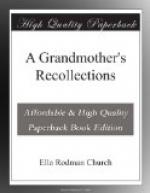CHAPTER VI.
One of my great troubles, and one too which I regarded in a pretty serious light, was the obeisance I had been taught to make on meeting “the minister’s wife.” I never came within view of this formidable personage that I did not hesitate and tremble; while I looked wildly around, in the vain hope of discovering a place of refuge. After performing my awkward courtesy, I usually hastened on as fast as possible, being oppressed with a most uncomfortable sensation of awe in the presence of Mrs. Eylton. This was occasioned by the quiet observance which I, like other children, took of the conduct of those around me. Everything in the house seemed to be at her command; if Mrs. Eylton sent for a thing she must have it immediately; and I drew my conclusions that “the minister’s wife” was a sort of petty sovereign, placed over the town or village in which she resided, and that all we possessed was held under her.
Almost every day brought a request from Mrs. Eylton for the loan of some article in our possession; a repetition of which would naturally lead one to conclude that ministers merely procured a house, and then depended for everything else on the charity of the public. This borrowing mania appeared to gather strength from indulgence, for none of the neighbors would refuse, whatever the article might be; and our waffle-iron, toasting-fork, Dutch-oven, bake-pan, and rolling-pin were frequently from home on visits of a week’s duration. On sending for our muffin-rings or cake-pans, we often received a message to be expeditious in our manufactures; that Mrs. Eylton could spare them for a day or so, “but wanted to use them again very shortly.” Our parents would buy such conveniences, send them to the kitchen of Mrs. Eylton, and borrow them from time to time, if in perfect accordance with that lady’s convenience. She would even borrow her neighbor’s servants, and often at very inconvenient times. Jane had often been sent for to take care of the children; and the usual request came one afternoon that seemed to me stamped with most remarkable events.
We were in a kind of sitting-room on the ground-floor, and my father sat writing at a small table near the window. A servant entered with the announcement: “Mrs. Eylton, ma’am, wants to borrow Jane.”
An expression of vexation crossed my mother’s countenance as she remarked: “I do not know how I can possibly spare Jane this afternoon; Mammy has gone out, and I do not feel inclined to attend to the children myself.”
My father looked up from his writing as he observed: “Nor do I see the necessity of your being troubled with them, Laura.”
“Not see the necessity!” exclaimed my mother, “How can I refuse the wife of our minister? I would be willing to put up with some inconvenience for Mr. Eylton’s sake. Poor man! he has a hard time of it, with his talents and refinement.”




